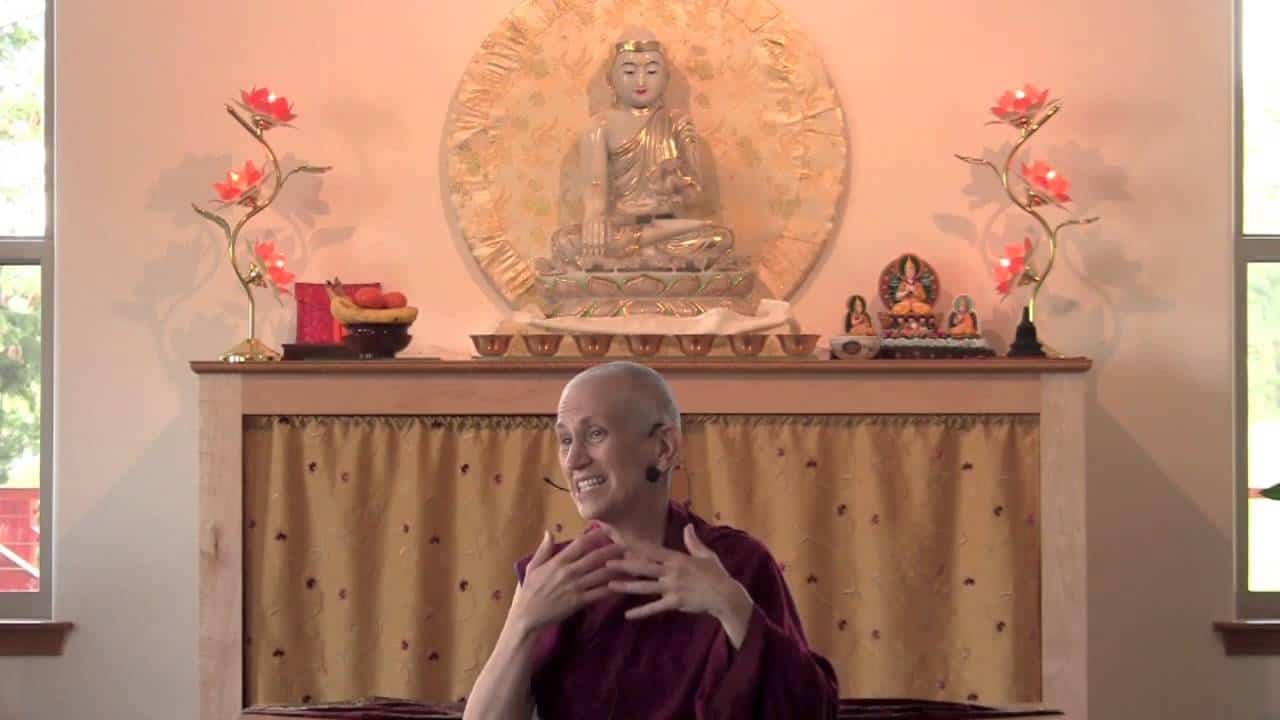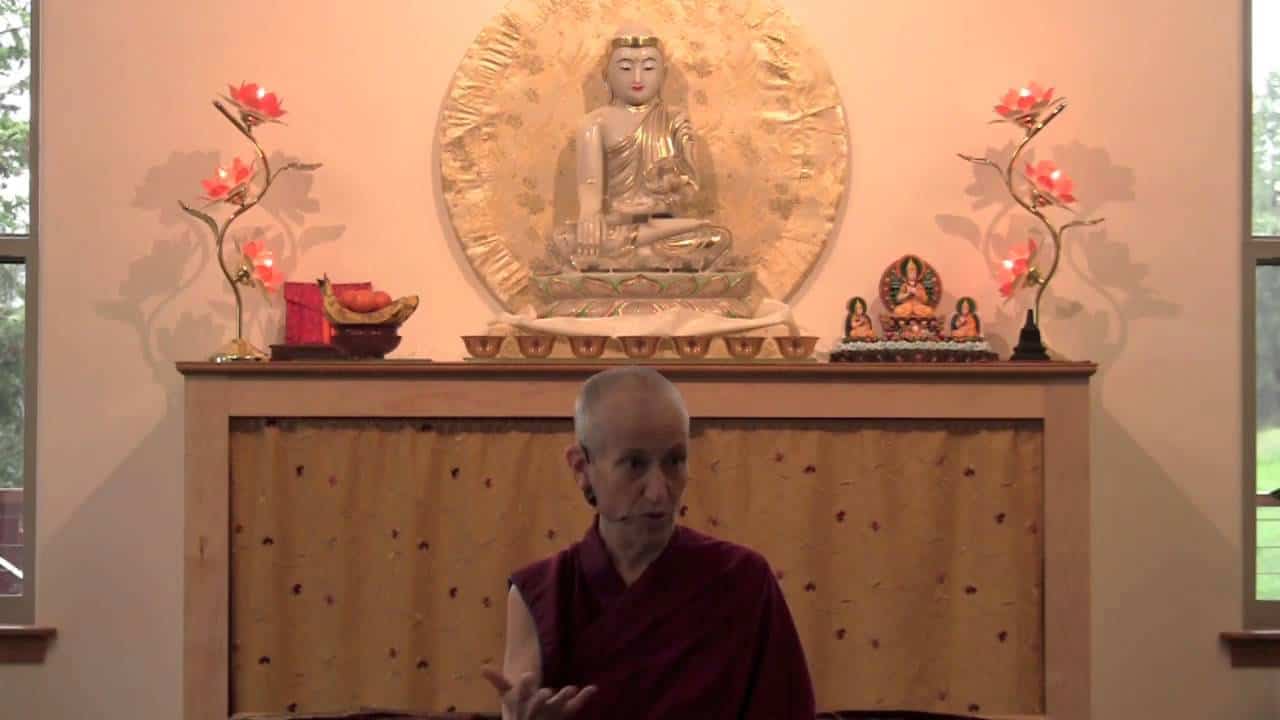Verse 97: The supreme goodness
Part of a series of talks on Gems of Wisdom, a poem by the Seventh Dalai Lama.
- The importance of not harming sentient beings
- Helping in worldly ways where we can
- The long-term goal and the best way to benefit others
Gems of Wisdom: Verse 97 (download)
What is the supreme goodness always beneficial to others?
Pacifying and completely subduing one’s own difficult-to-tame mind.
We often think: “What can I do to benefit others?” And of course, especially sending aid to Nepal, doing things like this would be very beneficial. Helping the Rohingya people, especially the migrants out at sea. Doing things like this is always beneficial.
But what’s the supreme goodness, the supreme way to benefit sentient beings is, at the very least, to not harm them. Because until we are able to stop harming sentient beings then, even if we’re helping them we’re also harming them in some other way. So taming our own difficult-to-tame mind is our first task.
Sometimes we come to the Dharma and we hear about working for all sentient beings and immediately our mind goes out and “I’m going to be the Buddhist Mother Teresa.” You know? And helping everybody with their own problems right now. And while helping people with their own problems of this life is definitely important to do, it’s not the supreme of helping because we can benefit people in this lifetime, but if they don’t know how to abandon negative karma and create virtue they will create the cause for more pain and suffering in future lives.
So the best way, really, to benefit sentient beings is to teach them about the law of karma and its effects, and about the disadvantages of self-centeredness, because that way at least they can avoid the causes of harm and create the causes of happiness. And that gives them the power to do that, and that will last a long time into future lifetimes.
But to do that, we have to be able to do it ourselves. And when they talk about the four ways of attracting people and gathering disciples, one of them is “practicing what you preach.” That’s really important, if we’re going to help sentient beings learn about karma, that we follow the law of karma ourselves. And if we teach sentient beings about subduing afflictions, that we are trying to subdue our own afflictions ourselves. We may not be perfect in doing it, but we need to at least be trying. And we need to own up to our own lack of being able to do it completely rather than creating some kind of perfected image of “well I’m almost buddha,” you know?
So when you think about the supreme charity to give to sentient beings, the charity of our love and compassion that extends equally, impartially, to all sentient beings—that’s kind of the best charity. To be able to respect each sentient being. Because very often for living beings what’s more important to them even than material goods to stay alive, is just being respected. Just being respected, acknowledged as a worthwhile human being, is often much more important to people than having a meal. So being able in our mind to have respect for everybody is a great act of generosity. And showing that respect to others is really a great act of generosity.
The best way to create freedom in the world is to free our own mind from anger and hatred and jealousy and so on, because unless we free our minds from our own afflictions how are we going to benefit anybody? People will just be objects of all of our afflictions, which doesn’t benefit them, doesn’t benefit us.
So when it says “What is the supreme goodness always beneficial to others? Pacifying and completely subduing….” In other words, eliminated the afflictive obscurations, “…one’s own difficult-to-tame mind.” The Seventh Dalai Lama is saying very directly, our mind is difficult to tame. True or not true? Definitely true. So this is kind of a long-term goal for us. And we benefit sentient beings in this life as part of that. But we have to stay focused on the long-term goal in order to be really effective. And to really think about the role of karma and being able to teach others about karma, and to practice according to the law of karma and its effects in our own lives, how important that is.
So that’s the supreme gift. That’s the supreme charity, the supreme freedom.
One time Lama Zopa wrote a letter to me…. He said what you’re doing by being ordained is more important than what Mother Teresa is doing. And I’m going, (what?). Because he explained, what Mother Teresa is doing is wonderful and incredible for sentient beings, but it benefits them just in this lifetime. And you have no idea whether there’s going to be any ripple benefit to them in future lifetimes. But he said when you’re keeping your vows as a monastic and trying to subdue your mind and really practicing, in the long term (maybe not in the short term) but in the long term then that’s going to work out to be more beneficial because you’re going to harm fewer people and be able to do more good for sentient beings.
Venerable Thubten Chodron
Venerable Chodron emphasizes the practical application of Buddha’s teachings in our daily lives and is especially skilled at explaining them in ways easily understood and practiced by Westerners. She is well known for her warm, humorous, and lucid teachings. She was ordained as a Buddhist nun in 1977 by Kyabje Ling Rinpoche in Dharamsala, India, and in 1986 she received bhikshuni (full) ordination in Taiwan. Read her full bio.


